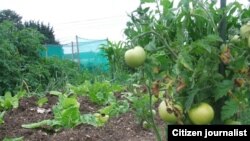Some new farmers who benefited from President Robert Mugabe’s land reforms in the Mazowe district of Mashonaland Central province say the shortage of working capital is hampering their efforts to produce.
The farmers say they are happy they benefited from the agrarian reforms and that they are now proud owners of their ancestral land.
But it’s the absence of financial resources to help them produce that is bothering them.
Baldwin Mazango of Umsasa Farm, who grows a variety of crops including maize, cucumbers and potatoes, is one of the new farmers yearning for Mr. Mugabe to give them title to land so they can start borrowing against it to fully utilize the farms.
He says despite occupying the property in 2008, his efforts to grow the farm are being hampered by lack of resources.
“If we had the (Zimbabwe) dollar before when the government was still supporting us, you would be seeing green (crops) everywhere,” said Mazango.
“This is not from any political point of but from a practical point of view.”
Investors
Mazango is now appealing to foreign investors who may want to put their money in Zimbabwe to consider working with newly resettled farmers.
“I want this to be as medium scale farm which exports, which does not stands out but which shows that this land reform program was really worth it. Of course with the politics going on with the European bloc, I would not mind exporting to Europe,” he told VOA.
Meanwhile, the agriculture portfolio secretary in the MDC formation led by former Prime Minister Morgan Tsvangirai, Valentine Ziswa, says new farmers should be given title deeds to access loans from financial institutions.
Banks are currently not offering loans to new farmers because they do not have collateral.
“Other financial institutions are owed huge amounts of money to the extent that they are not able to service serious farmers anymore apart from the fact that some of them are facing collapse or have downsized operations,” said Ziswa.
Mazango said electricity shortages are also contributing to low production on the farms as they fail to irrigate their crops during the current dry season.
Extension Workers
On the other hand, Ziswa says farmers require frequent agricultural lessons but bemoaned the lack of resources to finance the activities of the agricultural extension services.
“You just see agricultural extension workers sitting because they have no resources to work with, they have no cars, even bicycles,” he said.
Meanwhile, Mazango said he was happy that many farmers in his area were now getting farming advisory services from private consultants.
One of the private consultants, Jeremiah Gwanzura, tells VOA Studio 7 that their advice is that farmers should take farming as a business and not a hobby.
Mazango, though struggling, says he is looking forward to exporting his produce and hopes to get better value for his crops.
While new farmers continue to register low agricultural output due to lack of resources, Lands Minister Douglas Mombeshora announced recently that the government would soon be repossessing all the remaining white-owned farms to parcel them out to black Zimbabweans.
The move was criticized by the Ziswa and the Commercial Farmers Union.
Meanwhile, First Lady Grace Mugabe, whose family grabbed a number of farms in Mazowe district, says those failing to utilize their allocated pieces of land should move off the properties.
“People should be honest enough to say they have failed to utilize the land and give it up so that it can be given to others,” said Mrs. Mugabe.
Some economic analysts say Zimbabwe’s economic plunge may continue for years to come if agricultural production remains at an all-time low.






